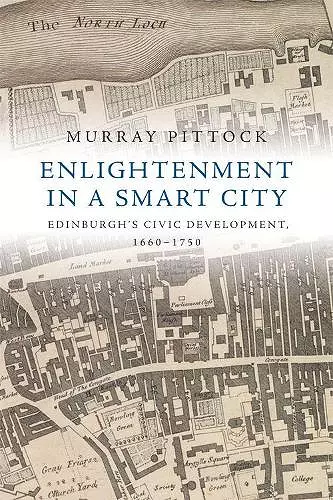Enlightenment in a Smart City
Edinburgh's Civic Development, 1660-1750
Format:Hardback
Publisher:Edinburgh University Press
Published:4th Dec '18
Currently unavailable, and unfortunately no date known when it will be back

This is a study of Enlightenment in Edinburgh like no other. Using data and models provided by urban innovation and Smart City theory, it pinpoints the distinctive features that made Enlightenment in the Scottish capital possible. In a journey packed with evidence and incident, Murray Pittock explores various civic networks – such as the newspaper and printing businesses, the political power of the gentry and patronage networks, as well as the pub and coffee-house life – as drivers of cultural change. His analysis reveals that the attributes of civic development, which lead to innovation and dynamism, were at the heart of what made Edinburgh a smart city of 1700.
The book offers such an all-encompassing, interdisciplinary narrative that there is something here for everyone. In scale and price, this is an introduction for both general readers and academics - a must for every tea table (or should that be desktop?). Title and text use contemporary terms such as smart, connectivity, router, and node presenting the development of Edinburgh in terms of modern communications systems... If an Edinburgh museum or gallery should ever wish to display the Enlightenment, the scholarship in this book and its author's deep knowledge of the subject would provide a platform from which to immerse visitors. -- Anthony Lewis, Glasgow Museums * Eighteenth-Century Scotland *
The unique selling point of this book is the application of contemporary research to historical analysis… its contribution to the field cannot be disputed… the depth of analysis and breadth of material covered overall makes for an enthralling and thought-provoking read… Plenty to amaze and amuse. -- Helen Young * History Scotland *
[Enlightenment in a Smart City] gathers together a wide range of interesting evidence, marshalling it in a fast-paced and absorbing narrative. It will appeal particularly to academics and researchers, but there is plenty to interest a broader audience here too. -- Chris Fleet, National Library of Scotland * Journal of the Edinburgh Bibliographical Society *
Extraordinarily impressive… There is such richness here it is hard to know what to emphasize… Each chapter is an Edinburgh in itself, so closely packed is it with relevant information… the case Pittock makes is conclusive: he demonstrates that Jacobites and Jacobitism did make a positive contribution to the Scottish Enlightenment. -- Andrew Hook * Scottish Review *
A vibrant and compelling examination of the Scottish Enlightenment in which the city of Edinburgh deservedly takes centre stage. -- Cathryn Spence, Vancouver Island University * The Innes Review *
Murray Pittock has now done for Enlightenment what he did for Jacobitism: take something that we thought we knew and show us what it really was and what it can be for us. By discovering the "mechanics" of Enlightenment in a "smart city" in the past, he helps us envision what we might do with our cities today. -- Clifford Siskin, Director, The Re:Enlightenment Project, New York university
Murray Pittock’s revelatory study of "the mechanics of Enlightenment" is an essential book for anyone interested in Edinburgh, eighteenth-century Scotland, and cultural history more broadly. Focusing on infrastructure, networks and institutions rather than individuals, Pittock provides a model account of how certain cities become centres of intellectual and artistic innovation. -- Ian Duncan, University of California, Berkeley
It makes an extremely valuable contribution to Scottish history in this period, and urban and Enlightenment history more generally. I would also like to praise how readable it is, very much a page turner. I found it frequently highly compelling, and dripping with interesting snippets. Also I would like to praise the decision to initially publish the book as a low-cost paperback alongside a more costly hardback version. This is still relatively unusual for an academic history book, and makes the book affordable for a wider audience, as it deserves to be. -- Viv Dunstan
ISBN: 9781474416597
Dimensions: unknown
Weight: unknown
296 pages